Lubricants can be a vital part of a healthy sex life. A good lubricant can increase sexual satisfaction and generally make sex easier and more comfortable for both partners. However, lubricants are not without their problems. Some women can experience yeast infections and bacterial vaginosis after using some lubricants.
The vagina is a very delicate and sensitive tissue. It certainly isn’t a good idea to use just anything you find in your kitchen or bathroom, or any lotion or other substance that you think might work well as a lubricant for sex.
Many lotions and lubricants contain harsh chemicals and toxins that can irritate the sensitive vaginal tissues. With any type of irritation in the vagina, this can lead to infections, including yeast infections and other bacterial infections.
This is especially true if you are a woman who is prone to yeast infections. So it is wise to be vigilant as to what lubricant you and your sexual partner use during your lovemaking sessions.
Here are some common lubricant ingredients to watch out for that can cause vaginal irritation and infections:
Glycerin – Most popular brands of lubricants, including the leading brand in the niche, KY Jelly, have glycerin in their lubricant products. Glycerin is technically a sugar alcohol. Since any kind of sugar can feed yeast in the body, many people believe that using a product with glycerin in the vagina can either cause a yeast infection or make an existing infection worse. In fact, one of the most popular brands of lubricants, called Astroglide, says right on their website that using a lubricant with glycerin can make existing yeast infections worse. [1]
Since most water-based lubricants use glycerin as an ingredient, it would be wise to check their ingredients if you are concerned about yeast infections. Below you’ll find some water-based lubes that are glycerin free. It should be noted that there is no solid proof or scientific correlation that glycerin actually causes yeast infections, however. You can also choose silicone based lubricants, as these are glycerin free. A good example is Pjur Original Bodyglide, which is glycerin free and also latex safe.
Similarly, you’ll want to avoid any sugar alcohol as an ingredient in your lubricant as they may have a similar effect as glycerin. Sorbitol, mannitol, xylitol and maltitol are all popular sugar alcohols to watch out for.
Petroleum Jelly – It may surprise you to discover that some people use petroleum jelly as a sexual lubricant. For this lubricant, there is some scientific evidence that it causes vaginal issues. In a study of 141 sexually active women who used petroleum jelly as a lubricant (17% of them), it was found that their risk of bacterial vaginosis went up by over 20% compared to other women in study.
In fact, many doctors believe that petroleum jelly is possibly the worst choice you can make for a sexual lubricant because it stays in the vagina for days after sex and collects bacteria. In addition, petroleum jelly can make condoms less effective as it may cause condoms to dislodge.
Acetate – Many lubricants and vaginal cleaning products contain some sort of acetate. Acetate is another form of alcohol. Since alcohol is a substance that naturally dries out skin, it can cause irritation and even raw skin. Dry or irritated skin can tear much easier than healthy skin. Any skin tearing can open you up to infections and even make it easier for you to contract a sexually transmitted disease, such as HIV. Look for any ingredient that ends in acetate in your lubricant products and try to avoid them.
Propylene Glycol – This ingredient is used as a preservative in many products, even in food products to increase shelf-life. Propylene glycol is also used as a solvent, classed with acetone and chloroform. It’s no surprise that something that is a solvent can be very irritating to your skin. It would be wise to avoid this ingredient in your lubricants as well.
Parabens – Parabens are chemicals made from para hydroxybenzoic acid. Parabens are used as preservatives in many products these days, from makeup to shaving gel to foods to deodorants to lotions and, of course, lubricants. They are used to inhibit the growth of fungus and bacteria in products. Since parabens are very inexpensive, they have become a widely used option as a preservative. What’s the problem with parabens?
Parabens can interfere with estrogen in the body. This is a problem since estrogen exposure is known to have an influence on your breast cancer risk [2]. Parabens are also shown to be carcinogenic, which can help fuel cancer growth in the body. It has been shown in scientific studies that parabens are absorbed into your body through your skin, so the more you use products with parabens, the more they build up in your body.
Luckily, there are lubricants that are chemical free that you can choose:
Aloe Vera – Aloe vera jelly is widely available and comes from the aloe vera plant. Aloe vera is very safe and known to actually have skin healing properties. Aloe vera is also a very slimy substance, making it perfect for use as a lubricant. Aloe vera does not have any negative effects on the vaginal skin.
Chemical Free – You can choose from many brands of chemical free lubricants that use safe ingredients. Some brands include Sliquid Naturals Silk, Swiss Navy All-natural, Good Clean Love and Wet Natural.
| Product | Type | Features | Buy |
|---|---|---|---|
Wet Natural Beautifully Bare | water based | Glycerine, sugar and Paraben FREE, hypoallergenic | buy here |
| water based | glycerin and paraben free, 100% Vegan, hypoallergenic, non-toxic | buy here | |
| water based | vegan, aloe vera based, organic | buy here | |
Swiss Navy All-Natural | water based | paraben, glycerin and petroleum free, all-natural | buy here |
Pjur Original BodyGlide | silicone based | glyercin and paraben free; requires soap to wash it completely; cannot be used on silicone sex toys, latex friendly | buy here |
References:
-
1. https://www.webmd.com/sex-relationships/features/lube-up-for-better-lovin

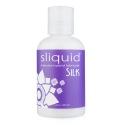
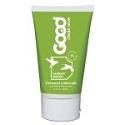
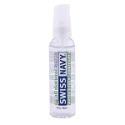
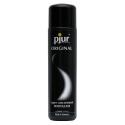

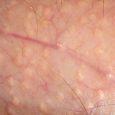



 Peter started condom-sizes.org in 2011 after realizing what a difference using a proper condom size really makes! In 2012 he published an e-book called 'How to Find Your Perfect Condom' which is still available on
Peter started condom-sizes.org in 2011 after realizing what a difference using a proper condom size really makes! In 2012 he published an e-book called 'How to Find Your Perfect Condom' which is still available on
Hi, your article was really helpful. How can I know it is safe to order from you. You know, with all the computer scams…thank you, corinna
Hi Corinna, thanks for the comment! I only recommend trusted and reputable online vendors. they accept Paypal so you don’t have to worry if your credit card information will be compromised and you know that you can dispute the payment with Paypal if anything goes wrong…
finally, if you still don’t feel safe ordering online you can look for these products in your local pharmacies
Hi,
What is your opinion on Astroglide Diamond Silicone Gel?
Recently all of a sudden I have had incurable pain during sex and am trying to find any solution possible to fix it. My gyno says there is nothing abnormal after my annual exam, but I still can’t figure out why I’m going through this…so I looked up different lubes and bought some of the astroglide. I still have pain…but I do like this stuff because it is LOW mess.
Any opinions? Thanks!
You could have vulvodynia. Some OB/Gyns don’t know about it. It’s pain of the vulva, and we’re not sure of the exact cause yet, but some topical nerve medications help. Physical therapy is also a helpful option. I got physical therapy for mine and it worked wonders.
Thank you for sharing this information. I suffer from BV and yeast infections that come back regularly and we have ruled out all else. I believe it is either diet (sugar, alcohol, caffeine, dairy,…) or the lube. After treatment from the doctor, I’ve been feeling well lately. Then we used astroglide, and it was awful! I just ordered the Sliquid Sample pack so that we can try all the types they offer. I think too many people suffer in silence when they deserve to have happy vaginas and happy sex lives. I also highly encourage every person with female genitalia to be taking probiotics and cranberry pills.
Ellen, thank you for sharing your experience!
Astroglide is the culprit for me too! I’ve never used it before but we bought organic water based and it was sticky. I have not gotten a yeast infection in years! (But bv has been my issue) so it was VERY irritating. Wish i knew sooner about these ingredients.